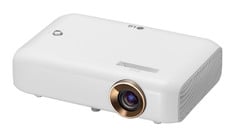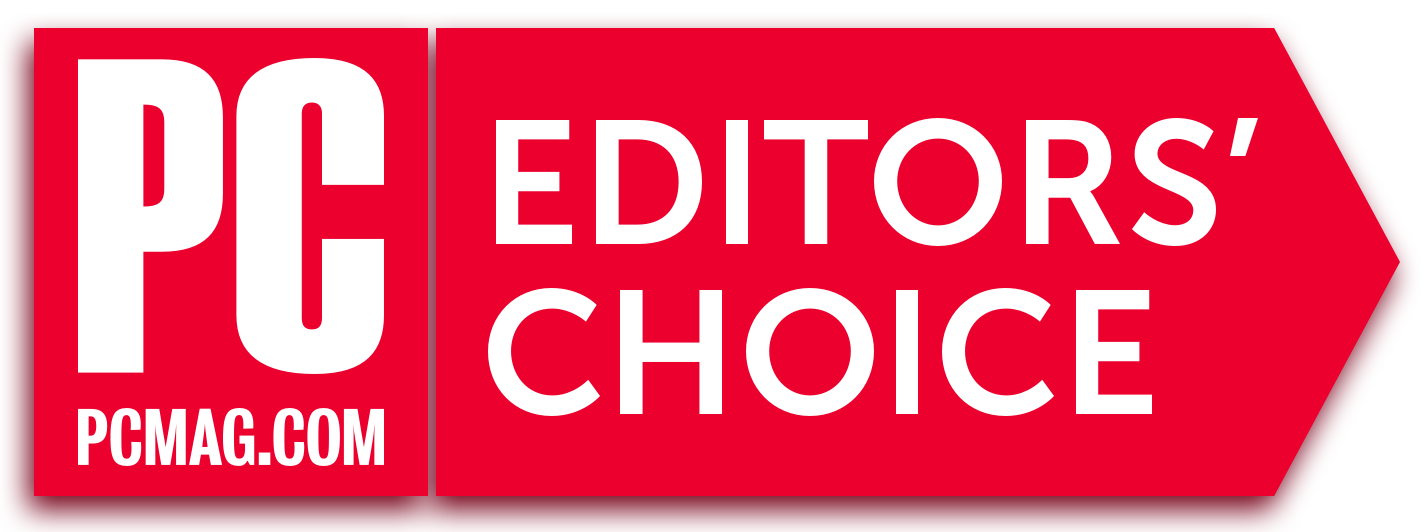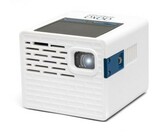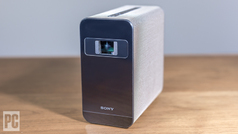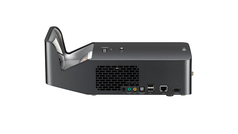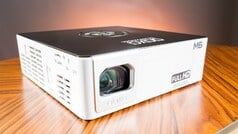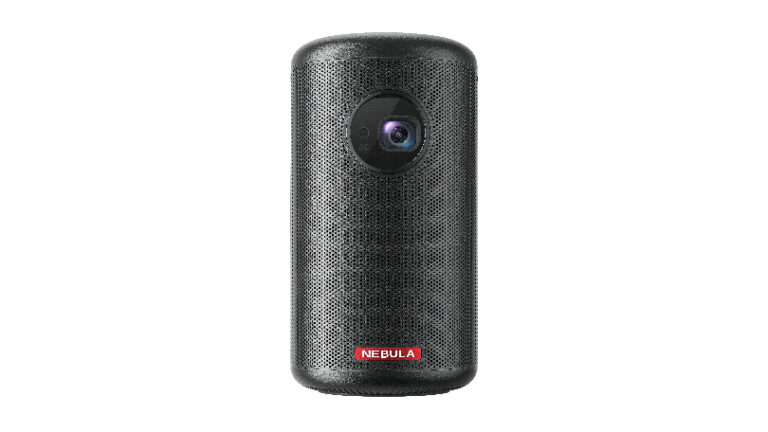
[ad_1]
While PC Labs has tested a fair number of Android-based projectors, the Anker Nebula Capsule II ($579.99) is the first we’ve tested that runs Google’s entertainment-focused Android TV operating system, and it proves itself an able pioneer. Video quality is more than adequate for viewing clips or movies, and it has an unusually loud sound system for a mini-projector, since it doubles as a Bluetooth speaker. The Capsule II’s main drawback is its low brightness, which means you’ll want to reserve it for use in darkened rooms.
Design and Features
The Capsule II ($499.99 at Amazon)(Opens in a new window) has a DLP-based light engine, employing an LED light source. (The lamp has a rated lifetime of 30,000 hours.) It provides 720p (1,280-by-720-pixel) native resolution at a 16:9 aspect ratio suitable for widescreen video. Anker rates the brightness at 200 lumens, which is modest for a palmtop-size mini-projector.
Similar Products
Measuring 5.9 by 3.2 by 3.2 inches (HWD) and weighing 1.8 pounds, the Capsule II is a matte-black cylinder standing on end, resembling a slightly oversize soda can or an Amazon Echo smart speaker. The latter analogy is apt, because the Capsule II packs an 8-watt sound system, which is unusually powerful for a portable projector.
On the top of the chassis is a four-way controller, as well as plus and minus volume-control buttons and a backspace button. On the rear, in the center, you’ll find the power button, as well as a second button that lets you switch between projection and speaker modes.
Along the bottom are four ports. One is an audio jack (meant for headphones or powered external speakers), and another is an HDMI input (for connecting with a computer or other data or video source). Also here is a USB Type-A port, which fits a USB thumb drive, a USB mouse, or a keyboard. The final port is USB Type-C, used strictly for charging the Capsule II’s built-in battery when connected with the included USB Type-C cable and power adapter.
Anker rates the Capsule II’s video runtime at 2.5 hours between charges, which is the same projected running life for the battery in the Editors’ Choice LG Minibeam LED Projector (PH550) . Anker’s number seems reasonably accurate, based on my testing. This, combined with its modest size and weight, makes it a good choice as a portable entertainment projector.
The Capsule II has both an autofocus function and automatic vertical keystone correction, making it easy to focus and align an image. Most of the time, the autofocus worked well in my testing, bringing photos, text, and video images into reasonably sharp focus within a second or so and bearing out the company’s claim of “1-second Autofocus.” However, a couple of times, the autofocus didn’t engage, and the image stayed blurred until I repositioned the projector, after which it achieved sharp focus in short order.
Getting Android TV Right
Over the past few years, we have seen a growing number of Android-based projectors, from the minuscule AAXA P2-A Smart Pico Projector ($227.31 at Amazon)(Opens in a new window) to the pricey Sony Xperia Touch ( at Amazon)(Opens in a new window) . While some early Android projectors were wildly dysfunctional—it could take an hour simply to enter a password, for instance—they’ve gotten a lot smoother over time. The Capsule II is the first Android TV-based model we’ve tested, and it continues the trend toward Android-projector goodness.
The Android TV interface is simple, with a column displaying icons labeled Apps (ones that came pre-installed, or that you’ve downloaded from Google Play), YouTube, and Play Movies & TV, as well as corresponding items from each displayed carousel-style. At the top right are a battery icon (giving you a very rough idea of how much charge is left), the standard gear icon for settings, and a digital clock. From Settings, you can set up Wi-Fi, search for Bluetooth accessories, and perform other tasks.
One big plus for the Capsule II is the variety of ways in which you can connect with, use, and control the projector. HDMI or Wi-Fi are your choices for PC-based connectivity. You can navigate menus using the controls on the projector’s top, as well as the included remote; the latter also lets you give voice commands to it through Google Assistant.
You can control the projector with the Nebula Connect app, which also lets you run some apps that you can’t get through the Capsule II’s Google Play store, such as Netflix. (It has to be side-loaded onto the projector from a USB drive by following instructions that Anker provides.) Speaking of which, you can display photos, show videos, or play music from a USB thumb drive. (The media can also be copied to and played from the projector’s 8GB of internal storage.) You can also use the USB port for attaching accessories; adding a mouse in this manner made navigating the Capsule II’s menu system quicker.
As I mentioned earlier, the Capsule II also works by itself as a Bluetooth speaker. You can play music on the device once you’ve paired it via Bluetooth with a phone or tablet. You can also mirror your phone’s screen over a Bluetooth connection by means of the projector’s built-in Chromecast functionality.
I successfully engaged all of these connection methods and interfaces, though mostly I used the remote to view video and access other content (such as a few games) through the Android TV interface. I downloaded several apps to the projector through Google Play, as well.
Video and Audio Quality
Based on my testing, video quality is fine for showing clips and even full-length movies, provided you’re in a fairly dark room. I occasionally saw rainbow artifacts—little red/green/blue streaks—in bright areas against dark backgrounds. But they were mild enough that they wouldn’t likely be distracting, even to someone sensitive to these so-called “rainbow effects.” Color balance was good, with the only issue a hint of blue in some white-dominant images.
 See How We Test Projectors
See How We Test ProjectorsWhere the Capsule II falters is when significant ambient light enters the picture. For all its virtues, the Capsule II is still relatively weak in brightness output for an entertainment projector. In a dark room, images look good at sizes up to at least 60 inches (measured on the diagonal), but video looks washed out when the screen is more than about 20 inches, once ambient light comes into play.
The Capsule II’s sound system consists of an 8-watt powered speaker and two non-powered bass radiators. Audio is loud and good-quality, and I can seldom say that about any mini-projector’s sound. When you’re not using the device for showing videos, it can serve as a quite respectable Bluetooth speaker for household or portable use. In contrast, the Editors’ Choice LG Minibeam LED Projector (PH550) has a pair of typically soft 1-watt speakers, and the AAXA P2-A also suffers from feeble audio. Both would be much better served with external speakers attached.
An Able Entertainment Projector…With the Lights Down
Judged as an entertainment projector for home and portable use, the Nebula Capsule II has fine video quality, and the fact that it incorporates the Android TV operating system is a plus, given the OS’s easy access to YouTube, Google Apps, and a range of content from Google Play. Also, the Capsule II’s sound system stands out among mini-projectors.
On the flip side, for a palmtop-class projector, its brightness is modest, and it is best used in a darkened room. While the LG Minibeam LED Projector (PH550) retains its Editors’ Choice status among palmtop projectors, the Anker Nebula Capsule II is an entertainment projector to be reckoned with.
4.0
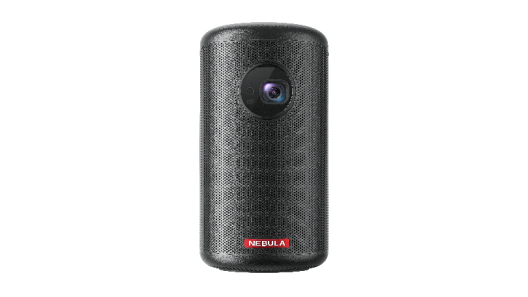
(Opens in a new window)
(Opens in a new window)
View More
The Nebula Capsule II by Anker is an unusual entertainment projector: It runs the Android TV operating system, and can double as a Bluetooth speaker.
[ad_2]
Source link : https://www.pcmag.com/reviews/anker-nebula-capsule-ii

